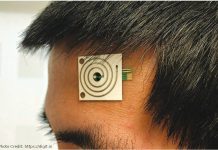 There were many movies which use the invisibility as idea of hide people or things.
There were many movies which use the invisibility as idea of hide people or things.
Trying to cloak something and make it invisible has been more fantasy than reality. Harry Potter used his invisibility cloak to sneak into places at school.
Actually the physicist Ulf Leonhardt was inspired by J K Rowling. Using a 100,000 pound grant to create a material that can bend light, he hopes to create a cloaking device that can render an object invisible. And while it may seem like a magical and far-fetched dream, the professor gave himself a goal of two years to create a “blueprint” for a practical cloaking device.
To make things invisible, the light would have to hit an object then return to its normal path. Metamaterials can literally do that – by changing the way the light bends around objects. Normally light bends as it passes through different types of materials. The textbook example is when light changes its path when it travels through air to water. It’s like looking at a mirage on a hot day.
Before 1999, it seemed impossible to render objects invisible. But over the past decade, researchers have been actively searching for the perfect material that could be used to change the laws of physics and make objects disappear. In 2006, theoretical physicist John Pendry at Imperial College London demonstrated that invisibility cloaks could theoretically work. Suddenly, science fiction was beginning to be the subject of serious scientific inquiry. Duke University engineer David Smith proved that Pendry’s idea is possible. Smith constructed a prototype later that year. The metamaterial cloaking device works in a broad range of frequencies and the invisibility cloak only worked in two-dimensions.
Recently, scientists have created an invisibility cloak made of glass and even created a three-dimensional cloak. Most cloaking devices are made to bend around electromagnetic waves like light. So for the most part, the cloaking devices have only work in the microwave region of the spectrum. Another limitation has been the size of the objects that have been made “invisible.” It’s been around a few millimeters in size – limited by the wavelength the scientists were using. But getting relatively big objects to disappear at visible wavelengths has been an issue. Ideally, you want to render objects invisible, so you can see it happening with your naked eye.
For the first time, physicists from two separate groups have created carpet rugs that can hide objects in visible light. The scientists made carpet cloaks from calcite crystals. The calcite crystal cloaks are more affordable than traditional cloaks. Calcite crystal is naturally occurring and is a cheap optical material.
Baile Zhang, an engineer at the Singapore-MIT Alliance for Research and Technology Centre, created a cloaking rug that can hide objects that can be seen by the naked eye. The object looks hidden because light reflects off the surface. The carpet rug can hide things in the millimeter range and do so in visible light but only if you are looking at it at the right angle. This cloak was designed to work under water. “I think that governments could make a lot of use out of a cloak that can hide objects on the seabed — although I won’t speculate on exactly what they may want to hide,” says team member George Barbastathis, a mechanical engineer also at the SMART Centre.
The other group out of the University of Birmingham and Imperial College London used the same material, but the cloak only worked in the air. It can make objects a couple of centimeters off the ground appear invisible. Developments in metamaterials could lead to better camera lenses and contact lenses. And invisible cloaks could allow aircrafts to fly under the radar and could get rid of that annoying static on your cell phones.
After all, New Scientist predicted that by 2039, invisibility cloaks would be part of our every day life. So we have to wait a little.



